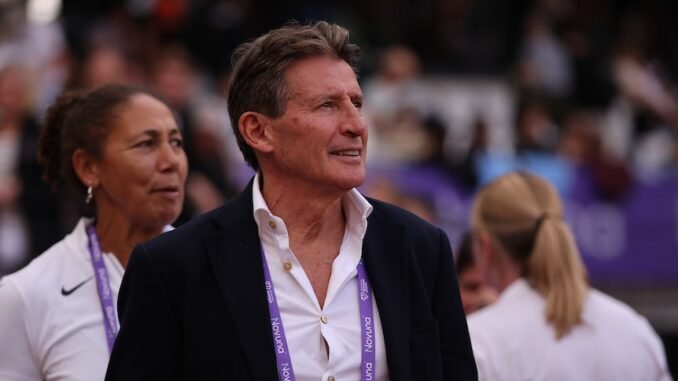
World Athletics Draws a Line in the Sand: September 1 Chromosome Test Deadline Could Shake Up Global Competitions…Read More…
In a bold and controversial move that’s already sending shockwaves through the global sports community, World Athletics has officially announced a firm deadline of September 1, 2025, for all athletes competing in gender-specific events to undergo and pass mandatory chromosome testing. This decision, which marks a new chapter in the long-standing debate over fairness, inclusivity, and gender identity in sports, is expected to have sweeping implications across international competitions, including the 2025 World Championships and beyond.
The Decision
The governing body’s statement, issued from its headquarters in Monaco earlier this week, emphasized that the move was designed to “protect the integrity and fairness of female categories while respecting scientific standards.” According to World Athletics President Sebastian Coe, the chromosome test deadline was not a knee-jerk reaction, but rather a policy years in the making, following countless studies, legal battles, and stakeholder consultations.
“The issue of biological eligibility is one of the most sensitive and critical facing our sport,” Coe said. “We are striving for clarity, consistency, and fairness. The September 1 deadline gives athletes and federations ample time to comply and prepare.”
What the Test Entails
The chromosome test in question primarily focuses on detecting the presence of Y chromosomes, which are typically associated with male biology. The new regulation applies to athletes competing in female-only events, particularly in middle-distance running, sprinting, and field events—disciplines where past controversy has been especially fierce.
Under the new policy, an athlete who wishes to compete in the female category must prove they do not possess XY chromosomes, or must demonstrate they meet certain reduced testosterone thresholds established by World Athletics in conjunction with independent medical panels. Athletes found non-compliant will either be moved to open or mixed-gender categories or barred from competition altogether.
The testing will be conducted in collaboration with national federations, with strict confidentiality protocols in place. However, critics fear that the personal nature of the tests could lead to stigma, invasive scrutiny, and emotional trauma.
Reactions From the Sports World
Reactions to the announcement have been swift and deeply divided. Some federations and athletes have praised the move as a necessary step to protect the integrity of women’s sports.
“We’ve seen cases where athletes with clear biological advantages have dominated female events,” said Australian sprinter Eliza Grant, a vocal advocate for stricter gender regulations. “This isn’t about exclusion—it’s about creating a level playing field.”
Others, however, view the decision as draconian, unscientific, or even discriminatory, especially toward intersex and transgender athletes.
“This policy reduces complex human identities to chromosomes and hormones,” said Dr. Natalia Okeke, a gender studies scholar at the University of Cape Town. “It ignores the psychological, social, and even anatomical diversity among athletes. It could lead to heartbreak, exclusion, and public humiliation.”
Athlete advocacy groups like Athletes for Dignity have called on World Athletics to delay implementation and establish a more inclusive consultation process. A statement from the group read: “While we respect the need for fairness, this policy undermines bodily autonomy and targets a marginalized group under the guise of science.”
Legal and Ethical Concerns
Legal experts predict a flurry of challenges ahead of the September 1 deadline. Human rights organizations have already flagged the policy as potentially violating international protections under the United Nations’ Charter on Human Rights and Dignity.
The Court of Arbitration for Sport (CAS), which has adjudicated on previous cases involving athletes like Caster Semenya, is expected to be flooded with appeals. Semenya, a South African Olympic gold medalist who has faced repeated bans under similar testosterone-based rulings, has been outspoken about what she calls “athletic apartheid.”
“This is not about sports anymore,” Semenya posted on social media. “It’s about who gets to exist, who gets to run, and who gets to be human.”
What’s at Stake
With the 2025 World Athletics Championships in Tokyo only months away, the September deadline could dramatically reshape who makes it to the global stage. Several top-ranked female athletes are reportedly under review, though no names have been officially released.
National federations are now in a scramble to verify compliance, conduct tests, and consult legal teams. Some have even begun lobbying for exemptions or alternative categories to ensure continued participation for affected athletes.
The move also raises questions about other sports governing bodies. Will the International Olympic Committee (IOC), FIFA, or World Rugby follow suit? Or will they resist and develop their own policies that balance fairness with inclusivity?
Looking Ahead
As the deadline looms, one thing is clear: World Athletics’ decision marks a pivotal moment in the evolution of competitive sports. Whether this leads to more equitable play or escalates a global controversy depends not just on science—but on how the sports world chooses to interpret humanity, fairness, and identity.
The next month promises to be one of the most turbulent and transformative in recent sports history. Whatever side of the debate one falls on, the impact of the September 1 deadline will be felt for years to come.
For ongoing updates and athlete reactions, stay with nextfootballnews.com
Leave a Reply